Perfectionism and Gifted Children
Second Edition
Rosemary Callard-Szulgit
Illustrated by
Mark K. Szulgit
Rowman & Littlefield Education
A division of
Rowman & Littlefield Publishers, Inc.
Lanham New York Toronto Plymouth, UK
Published by Rowman & Littlefield Education
A division of Rowman & Littlefield Publishers, Inc.
A wholly owned subsidiary of The Rowman & Littlefield Publishing Group, Inc.
4501 Forbes Boulevard, Suite 200, Lanham, Maryland 20706
www.rowman.com
10 Thornbury Road, Plymouth PL6 7PP, United Kingdom
Copyright 2012 by Rosemary Callard-Szulgit
All rights reserved . No part of this book may be reproduced in any form or by any electronic or mechanical means, including information storage and retrieval systems, without written permission from the publisher, except by a reviewer who may quote passages in a review.
British Library Cataloguing in Publication Information Available
Library of Congress Cataloging-in-Publication Data
Callard-Szulgit, Rosemary, 1946
Perfectionism and gifted children / Rosemary Callard-Szulgit.
p. cm.
Includes bibliographical references and index.
ISBN 978-1-61048-679-8 (pbk. : alk. paper) ISBN 978-1-61048-680-4
(electronic)
1. Gifted childrenEducationUnited StatesPsychological aspects.
2. Gifted childrenUnited StatesPsychology. 3. Perfectionism (Personality
trait) I. Title.
LC3993.2.C36 2012
371.95dc23
2012016300
 The paper used in this publication meets the minimum requirements of American National Standard for Information SciencesPermanence of Paper for Printed Library Materials, ANSI/NISO Z39.48-1992.
The paper used in this publication meets the minimum requirements of American National Standard for Information SciencesPermanence of Paper for Printed Library Materials, ANSI/NISO Z39.48-1992.
Printed in the United States of America
Other Titles of Interest by Rowman & Littlefield Education
Overcoming Student Apathy: Motivating Students for Academic Success By Jeff C. Marshall
Parenting and Teaching the Gifted , 2nd EditionBy Rosemary Callard-Szulgit
Making ADHD a Gift: Teaching Superman How to Fly By Robert Evert Cimera
101 Activities to Help Preschoolers Excel in Reading, Writing, and Speaking By Catherine DePino
Mind-Bending Math and Science Activities for Gifted Students By Rosemary Callard-Szulgit and Greg Karl Szulgit
Engaging Students: Using the Unit in Comprehensive Lesson Planning By Dianna P. Beirne and Kathleen G. Velsor
Dedication
To Karl Szulgit, my husband, the love of my life, my best friend, my support... always
To all perfectionist gifted children and their parentsI know your pain, I share your pain, I understand, and Im here to help
Preface
I am a recovering perfectionist. I never realized I was until thirty-five years ago when I began teaching a self-contained fourth-grade class of gifted children in a suburban school district of Rochester, New York. Within two days, I was stunned to see personality traits in my students that were identical to my own traits. I saw so much of myself in my students: not wanting to make a mistake; not realizing when enough was really enough (in projects and creative activities); concentrating on the perfect grade rather than enjoying the learning; fearfulness of using my sense of humor (in case my thoughts wouldnt really be funny); never feeling I was smart enough, even though in third grade I tested posthigh school in all the achievement-test scores; giving too much credit to what others thought rather than having confidence in what I was thinking or creating; worrying about things that in reality werent that important (age and hindsight are wonderful teachers). On and on the list proceeds.
I also saw all the wonderful traits I admire and appreciate in gifted nine-year-olds: wide-eyed innocence; loving, caring kindness; energy; a strong sense of morality; musical talents; artistic, sensitive, intuitive talents; highly reflective thinking abilities; shyness; gregariousness; leadership; wanting to be accepted; wanting to be cared for; wanting to please; avoiding work that requires thinking (they were used to getting As because they already knew the material). On and on this list goes toopositive qualities and inspirations for all children!
Since writing the first edition of this book in 2003, I can happily say I continue to be a recovering perfectionist. However, I better understand that admitting this status to my readers was initially fun, and now I firmly know this is easier said than done! Last month I realized I had been misspelling my orthopedic surgeons last name. I shuddered when I realized the error and have yet to send him a note of apology. Here, in front of the world, I admit my spelling mistake... sorry, Dr. Gorczyca!
Perfectionism is a wound. It hurts immensely and casts a cloud or shadow even on the sunniest of days. It can affect self-worth, relationships in families, relationships at work, even leisure time while youre playing and having fun.
My intention is not to present a gloom-and-doom picture about perfectionism. A sunny day with clouds in Arizona is still a beautiful day. Enjoying a walk around downtown Charleston when I visit is still exhilarating.
My intention with this book is to help gifted children and their parents gain a better understanding of perfectionism and how it affects their lives. Its sometimes hard to begin healing when were not aware that a wound exists.
Besides, I can more thoroughly understand now what being a recovering perfectionist is all about. Clouds, errors, misspellings, and less-than-perfect jobs accomplished dont stress me (or a least only minimally, compared to thirty-five years ago)!
I worked very hard to reach this stage in my life. How I accomplished this is related in chapter 6, How to Recover from Perfectionism, which also contains further suggestions.
Ive also included a chapter entitled Who Are the Gifted and Talented? There continues to be such a misunderstanding encompassing gifted children and how to serve them educationally. We now know that what works for gifted children works for all children. We know that using an inclusive process rather than an exclusive program is a much healthier way to assimilate the education for our gifted children into todays schools, avoiding the labels of youre gifted/youre not and youre in/youre out! Were erasing the dividing lines between the supposed haves and have-nots. Teachers cannot do it alone. Parents, administrators, and volunteers must help. As the school days demand increased responsibilities, our educators are desperately trying to serve children with a multitude of thinking levels and varied emotional development in their classrooms.
All children deserve to be educated at their cognitive levels. All children deserve to be happy and joyful. All children deserve to thrive in their accomplishments and creative endeavors.
No child should hurt, and perfectionism hurts!
May this book provide all of you reading it the understanding and support you need to love and nurture your wonderful children, working positively with your schools and educators, undoing any negative effects of perfectionism!
You can do it!
I did!
Ill help you every step of the way.
What Is Perfectionism?
Throughout my entire career in education, I have vehemently and continually stated that the number one social and emotional issue gifted children need to deal with is perfectionism. Not only does perfectionism hurt physically and emotionally, but it can interfere with relationships with family members, peers, teachers, coaches, neighbors, roommates, colleagues, business partners, and friends.
I am a recovering perfectionist. I can laugh saying it now, but I spent many of my younger years suffering with the pain of perfectionism. I can clearly remember the Sunday I was playing the Toccata and Fugue in F Minor. I was twelve years old and organist at the First Presbyterian Church in Medina, New York. I made a chord mistake and spent the afternoon crying on my bed because I was such a failure in my own mind and heart. Every week between the ages of twelve and eighteen, I prepared the organ music for the Sunday services. Can you imagine? I thought I was a failure because I would make an occasional playing error. Now I wonder how I could even assume that much responsibility at such a young and vulnerable age.

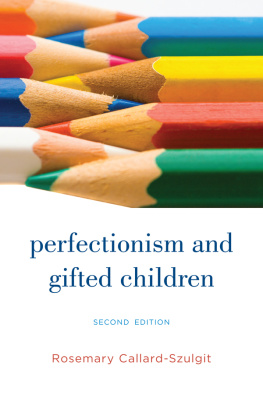
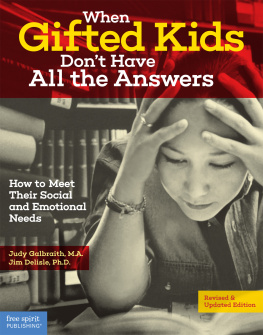
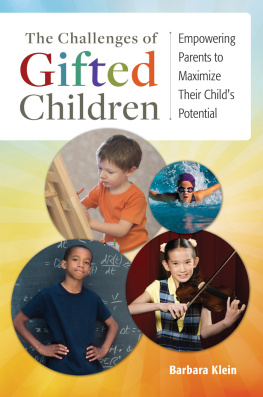
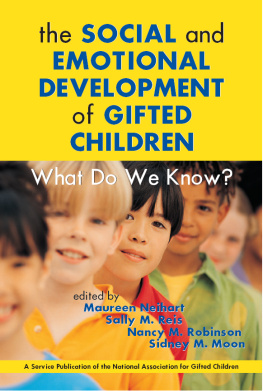

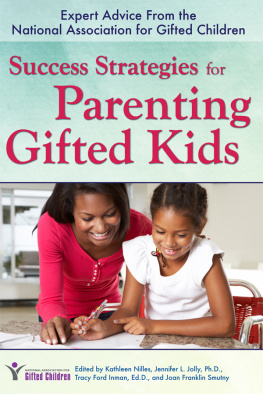
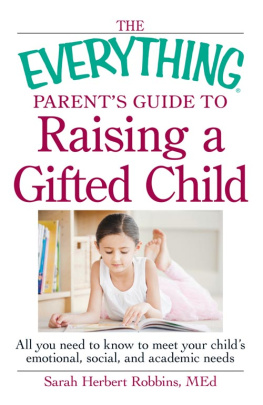
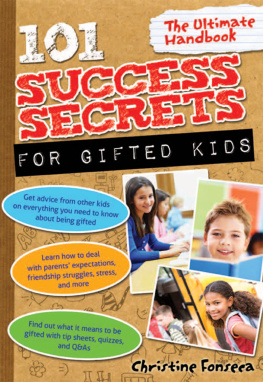


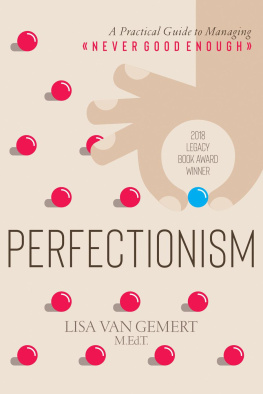
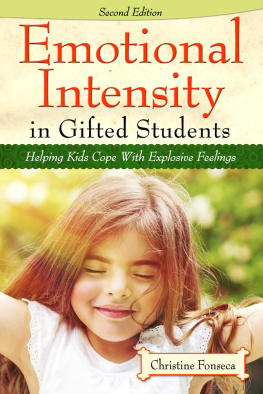
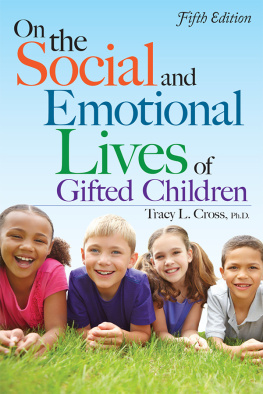
 The paper used in this publication meets the minimum requirements of American National Standard for Information SciencesPermanence of Paper for Printed Library Materials, ANSI/NISO Z39.48-1992.
The paper used in this publication meets the minimum requirements of American National Standard for Information SciencesPermanence of Paper for Printed Library Materials, ANSI/NISO Z39.48-1992.